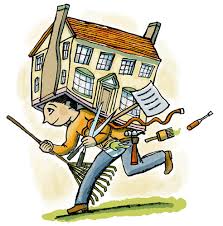3-Better Ways to Track Your Home-Related Expenses

Owning a home means having a place that’s safe and secure to come back to after a long day at work, every day, forever, until you decide it’s time to buy a different home. In exchange for all this homeiness, all you have to do is keep all the broken bits together, maintain the grass and track home-related expenses. Oh yes. If you don’t do a little bookkeeping, the tax man gets his and more. Might as well keep that cash as not, right? Why You Should Track Home-Related Expenses Your primary residence isn’t an investment, this has been said time and again (especially since the market crashed entirely), but that doesn’t mean that when you go to sell you have to take a loss. Far from it. In fact, as of the writing of this article, you’ll likely qualify for a tax exclusion (meaning you won’t pay taxes on this amount of profit from your home sale) of $250,000 if you file on your own or $500,000 if you and your spouse file your taxes together. But, if you sold and there was more than the applicable amount in gains, you’ll have to pay taxes only on the profit above the mark. When you have all your ducks in a row, it gets a lot easier to see what side of that line you stand on.
Reducing Your Tax Burden is the Goal. When your gain from your home sale exceeds your tax exclusion, there are two ways to help improve the situation with all those receipts you’ve been saving (you have been saving them, haven’t you?). First, you can deduct expenses related to selling your home, provided these are not expenses that affect the house physically. Think closing fees, brokerage commissions, and some seller-paid closing costs. The other way to reduce your capital gains burden is to produce records that account for your extensive remodeling. These are the kinds of projects you definitely need a hand with. They include, but are not limited to:
*Adding an additional room
*Upgrading your kitchen
*Replacing flooring
*Having new landscaping installed
*Putting on a new roof
The best part? These don’t have to be from the same tax year as when you sold. If you added that bedroom three years ago, pony up the receipts and reduce your tax burden. Unfortunately, regular home maintenance isn’t included on this list of ways to save a few dollars. Make sure you keep those receipts separate.
Get a Little Help From Your Friends. Keeping track of your personal finances, let alone the expenses related to your home, can be a daunting task. There are so many ways to pay these days and so many different kinds of things to pay for. This is the very reason, though, that you must be even more careful when tracking home-related spending. Everybody has their own system, to be sure, but some are clearly superior to others. For example, if your plan is just to toss a bunch of receipts in a bucket until you get around to sorting them and manually recording each one, you may want to look into something a bit more efficient. Even an Excel workbook is out-modeled these days, but there are several different types of apps you can use to help track your expenses, including: Complete personal finance apps. Popular apps like Mint and Wally are essentially full personal finance packages that happen to store receipts. While you can give these apps permission to grab you bank information from a variety of banks all at once, you may end up with enough data that it’s a trick to find those old receipts down the road.
Dedicated receipt storage. Shoeboxed, Receipts by Wave and Expensify are far more focused on the receipt part of your financial picture. All allow you to photograph and upload the receipts in question, can export the data you collect as a variety of reports and have a cloud-storage option, so you don’t have to worry that you’ll lose your receipts if you change phones or need to reload your operating system.
PS. BTW, Shoeboxed will actually take that bucket of receipts and process them for you if you mail them in. Receipt storage designed for homeowners. Not to toot our own horns, but toot toot. HomeKeepr allows you to scan your receipts in and helps you track home-related expenses automatically. All you need to do is snap a picture of your receipt and the software does the rest. You can then sort your receipts by the service type or business so you can see at a glance how much you’re spending on your project. Unlike other receipt trackers, HomeKeepr can track and maintain records for related items like appliance manuals and maintenance tasks that are due for your home.
Are You Ready to Invest in Your Home This Year? All this talk of bookkeeping and receipt scanning surely has you thinking about how much you’ve been wanting to redo the deck or hang new gutters. Well, today’s the day. Not only can you store those receipts in the HomeKeepr platform, your real estate agent can hook you up with some of the best contractors in your area. Just pop into your HomeKeepr community and check out who has been recommended for you. Your agent put their reputation on the line by providing these referrals, so you know they have to be good!
.jpg)




